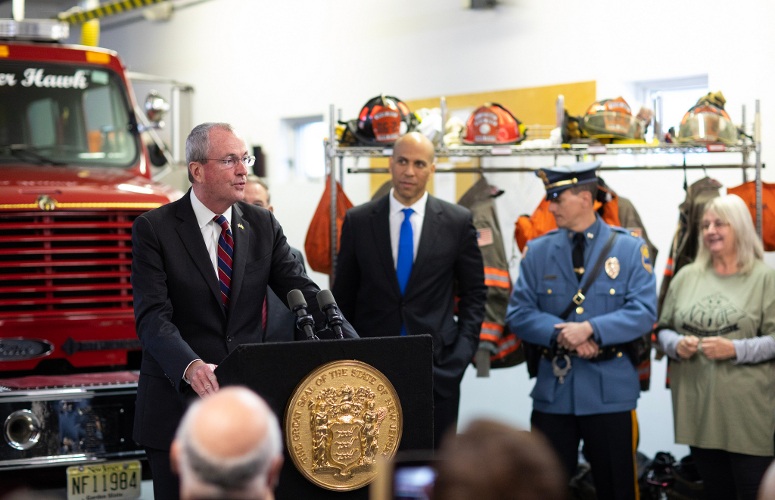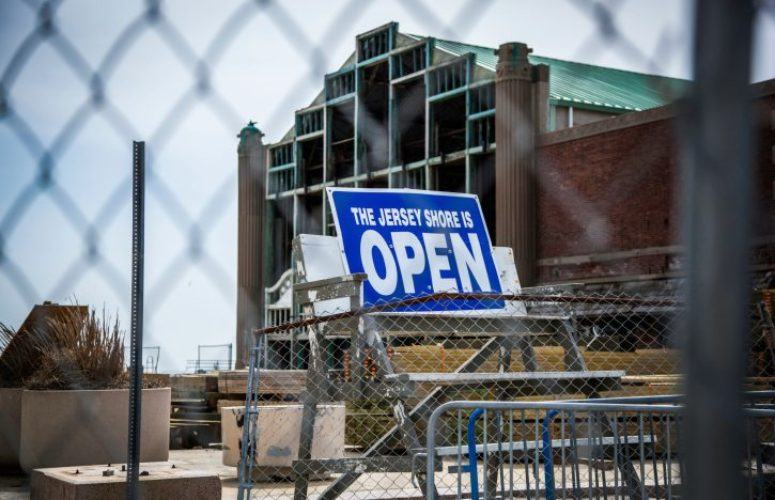
Major Changes to Sandy Recovery Housing Programs
On Oct 29, 2018Gov. Phil Murphy and Lt. Gov. Sheila Y. Oliver, commissioner of the New Jersey Department of Community Affairs (DCA), today announced significant changes to the Reconstruction, Rehabilitation, Elevation, and Mitigation (RREM) Program and the Low-to-Moderate Income (LMI) Homeowner Rebuilding Program, the two main housing recovery programs for homeowners impacted by Superstorm Sandy. The changes will enable program participants who have not yet finished construction on storm-damaged property to receive more money to complete projects. Participants who owe money to the program will also have an opportunity to demonstrate that repayment of the amount owed will create an extreme financial hardship.
“With these programs, our objective is to find a path forward for the homeowners who have not finished rebuilding and who find themselves stuck because they don’t have the financial means to move ahead,” said Governor Murphy. “We want to work with people who are struggling financially to determine what they can realistically contribute, and we want to get them across the finish line so they can return home and get some much-overdue normalcy in their lives.
For the approximately 1,200 homeowners in the RREM Program and the LMI Program who have not completed construction, DCA is proposing a zero-interest, forgivable loan to fully fund unmet needs above and beyond the maximum $150,000 grant.
“By supplementing the $150,000 grant with a new loan component to the programs, we are eliminating any financial barrier to completing construction in a way that is fair and equitable,” said Lieutenant Governor Oliver, Commissioner of the DCA. “Today’s announcement shows DCA is working creatively and purposefully to help remaining homeowners complete their projects once and for all.”
“When right wing Republicans blocked relief funding, I fought back and brought our region $60 billion to rebuild. When flood insurance premiums were about to spike, I passed a law stopping them, saving homeowners $50 million. When survivors faced frustrating delays from the Christie Administration, I pushed for changes to their botched system so homeowners could get assistance and rebuild quicker,” said Senator Menendez. “And when survivors came to me with horror stories of being lowballed by their insurance company, I led a Senate investigation that uncovered systemic fraud and abuse, and got homeowners an additional $260 million they were entitled to.”
“I could not be more thankful that now we have a productive partner in the Governor’s office who Senator Booker and I are proud to work and alongside to reallocate federal Sandy dollars to homeowners who still need help getting back in their home,” Senator Menendez added.
“Although six years have passed, we will never forget the pain of Superstorm Sandy and the impact it had on New Jersey families,” said Senator Booker. “I applaud Governor Murphy’s commitment to helping New Jerseyans devastated by this historic storm make their lives whole. Under Senator Menendez’s leadership our delegation fought for every available federal resource in the wake of Sandy, and we will continue to stand with Governor Murphy in rebuilding New Jersey stronger and more resilient in the face of future disasters.”
“Six years ago, when Superstorm Sandy hit our coast, people lost their lives, homes and businesses were destroyed, and local infrastructure was devastated,” said Congressman Pallone. “I will never forget my first moments on the ground touring the damage Sandy wrought in New Jersey – like the homes that were battered to the ground in Union Beach and the whole business section on Bay Avenue in Highlands that was under water. I knew then that I needed to begin the hard work to bring the necessary support and resources to our state to help New Jersey rebuild, and that is why I fought hard in Congress to pass the Sandy relief package and to secure the aid needed to help victims put their businesses, homes and lives back together. I will continue to work with Senator Menendez and Governor Murphy to pass food insurance reform and whatever is necessary to assist the victims of Sandy and prepare for the next storm.”
The proposed loan would be uncapped, would require no monthly payments, and would be calculated based on the remaining work needed to finish the project, taking into account other funding sources available to homeowners such as flood insurance and Small Business Administration (SBA) loans. The loan could only be used for eligible costs under the RREM or LMI Program. Homeowners who accept a loan would be required to live in the home for 15 years following construction completion. If the homeowner were to sell the home prior to meeting the residency requirement, a portion of the loan would be due upon sale.
DCA must receive approval from the U.S. Department of Housing and Urban Development (HUD) to implement the loan. In the next several weeks, DCA will release a Substantial Amendment to New Jersey’s Community Development Block Grant Disaster Recovery (CDBG-DR) Action Plan that proposes to create a new loan component to RREM and the LMI Program and to reallocate $50 million in CDBG-DR funds to the two programs. The amendment process will include a public hearing and a public comment period.
Additionally, in instances where homeowners with completed projects are required to repay excess grant funds, they will now be eligible to apply to DCA for an extreme financial hardship allowance. If the hardship is granted, DCA will use a uniform test to evaluate the homeowner’s ability to pay and may provide forgiveness of some or all the debt that remains to be paid. This includes homeowners who have lost their homes to foreclosure, the heirs of program participants who have died, and homeowners who have declared bankruptcy.
The RREM Program is the State’s largest Superstorm Sandy housing recovery program. RREM provides grants to Sandy-impacted homeowners to cover rebuilding costs up to $150,000 that are not otherwise funded by insurance, FEMA assistance, SBA loans, or other sources. Similarly, the LMI Homeowner Rebuilding Program provides up to $150,000 in reconstruction, rehabilitation and elevation assistance to Sandy-impacted homeowners of limited financial means who did not apply to the RREM Program. Together, the RREM and LMI programs have already rebuilt approximately 6,420 Sandy-damaged homes.
For more information about DCA’s Sandy recovery programs, go to https://www.renewjerseystronger.org/.
To access more business news, visit NJB News Now.
Related Articles:





